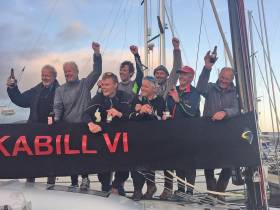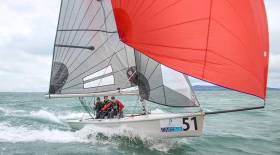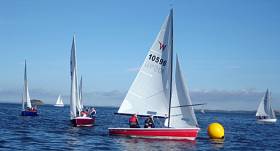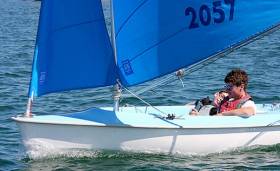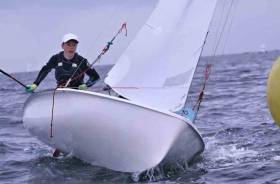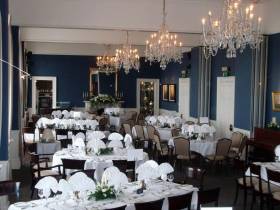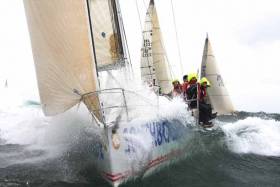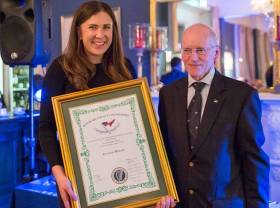Displaying items by tag: nyc
#NYC - A family flotilla to Dalkey Island will kick off a day of celebrations to mark 50 years of the National Yacht Club’s Junior Section on Sunday 2 July.
Club boats will be available for use by the families of members, while all bigger boats are welcome to join in the festivities on the day.
There will also be an ‘amphibious mystery tour’ collecting from the club at 3.30pm for junior youth sailors older than 8 years unless accompanied by a parent.
Bookings for the day (€25 including the tour, €15 without, plus €10 for the parents’ BBQ) can be made on the NYC website HERE.
Events to mark the Junior Section’s golden jubilee began last month with a reunion dinner, as previously reported on Afloat.ie.
Rockabill VI Gets To Dingle In Time For Dinner
#D2D - In Dingle of a warm summer Friday’s evening, the night has barely started at 9pm, writes W M Nixon. So the multi-talented crew of Paul O’Higgins’ JPK1080 Rockabill VI were in plenty of time for a leisurely winner dinner when they swept across the finish line in the Volvo Dun Laoghaire to Dingle Race 2017 at 2048 hrs to stake what looks like an unassailable claim to have won just about everything in this race for which they’re eligible.
There have been Dingle Races in the past where the nearer you got to the finish, the more difficult it was to find enough breeze to close the race. But this time round, Rockabill VI has found such sparkling conditions towards the end that, with a warm yet brisk fair wind sweeping her up the majestic Dingle Bay, she covered the last nine miles in less than an hour.
Considering the miserable conditions everyone was enduring only 30 or so hours ago, it was an almost supernatural change to the weather. But with this crew and this rather special boat, Paul O’Higgins had the combination to make the best of the rough going, and yet have some real champagne sailing when the weather improved.
The crew who shared this victory with him were Conor O’Higgins, Mark Pettit, Ian O’Meara, Peter Wilson, William Byrne, Rees Kavanagh, and Ian Heffernan. Many have done the Dingle race before, with some of them winning in times past. Many will do it again. But the totality of Rockabill VI’s win — with line honours thrown in despite the fleet having started with many larger boats — is more than enough to be going along with for now.
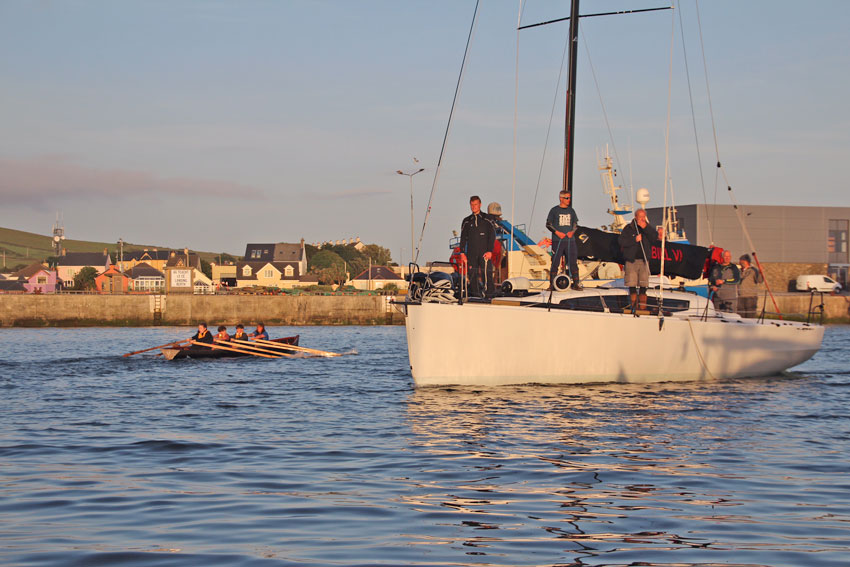 Rockabill VI coming into dock earlier this evening | Photo: Rebecca Hayter
Rockabill VI coming into dock earlier this evening | Photo: Rebecca Hayter
The mainly southwest breeze is distinctly firmer the further north you go, and back at Mizen Head a surprisingly persistent flat patch has provided an obstacle at which nearly everyone has stumbled. Thus as Rockabill came careening into the finish, back at the Mizen, Rónán Ó Siochrú of Irish Offshore Sailing, with his school yacht the Jennneau 37 Desert Star, was finding the going very sticky at just 3.4 knots. It was very frustrating after the very businesslike way he came past the Fastnet to take the Racing 2 lead from Ian Hickey’s Granada 38 Cavatina, which is herself now (at 2100 hrs) at the Fastnet Rock, and back in the Racing 2 lead.
In the cruising division, the Tyrrell family’s J/112E Aquelina lost the lead to the Dufour 40 Pipedreamer (Paul Sutton) thanks to an unscheduled slowdown at Mizen Head. But there’s a long way to go yet for these mid-fleet boats.
Up in front, the Two-Handed Division leader Soufriere (Stephen O’Flaherty & David Cagney) is sailing in a style which befits a stately Spirit 54, and she’s there in a bunch with various J/109s of which the leader is Mojito (Peter Dunlop & Vicky Cox), which now seems firmly placed to take second overall, but by this time quite a distance astern of Rockabill VI.
It has been, and continues to be, an intriguing edition of the Dingle race which will be worthy of further analysis. But for now, the night is Rockabill VI’s, and she won it well.
Read all Afloat.ie's 2017 Dun Laoghaire to Dingle Race coverage in one handy link here
#VolvoRegatta - Do you or someone you are sailing with in this summer’s Volvo Dun Laoghaire Regatta have an interesting story to tell about why and how you got into sailing?
Maybe you have a health issue which makes sailing extra challenging for you? Maybe you are boat builder by night? Maybe you have sailed the world’s seas and oceans and are now happy to compete in Dublin Bay?
If any of these questions applies to you, the media team or the 2017 Volvo Dun Laoghaire Regatta would love to hear from you. Get in touch with [email protected] for more.
In other regatta news, the National Yacht Club is seeking club volunteers and junior instructors to staff the 38 RIBs required to ensure the smooth running of the event from Thursday 6 to Sunday 9 July.
Any NYC members as well as those from other waterfront clubs who can help out for the week may register their interest via the submission form HERE.
Charter An NYC Wayfarer For The Dun Laoghaire Regatta
#Wayfarer - The National Yacht Club is offering to members a special charter for its four club Wayfarers during the Volvo Dun Laoghaire Regatta this July.
The NYC will be the host club for the Wayfarer class hosting its Irish National Championships during the regatta — making this the ideal opportunity to take part.
Dinghies will be sailing on Friday 7, Saturday 8 and Sunday 9 July with charter fees set at €40 per day (€120 per boat for the event).
A €150 pre-authorised damage deposit will be applied on your credit card but not debited.
To book your Wayfarer, use the form available on the NYC website HERE.
Dun Laoghaire Sailability Programme Returns For 2017
#Sailability - Dun Laoghaire’s waterfront clubs have launched their 2017 sailability programme for children ages 8-17 with physical and/or sensorial disabilities.
The programme kicks off with a try sailing event on Sunday 11 June at the Royal Irish Yacht Club, with morning sailing proper commencing at the Royal St George on Sunday 18 June, continuing each week (except 9 July and 6 August) till 20 August in conjunction with the Dun Laoghaire Motor Yacht Club.
There will also be two week-long sailing courses, provided by the National Yacht Club (12-16 June) and the Royal Irish YC (8-11 August).
No sailing experience is necessary to take part in the sailability programme, sponsored in 2017 by the Spirit Motor Group Volvo Ireland and the Water Wag sailing class, among others.
For general enquiries and further details, contact Ian French (087 245 6834 or [email protected]) or
Ruth Shanahan (086 237 4801 or [email protected]).
#TrySailing - No boat is required nor previous sailing experience necessary for teenagers who want to try sailing with the National Yacht Club this summer.
Two introductory courses will run from 6-16 June and 10-21 July in Dun Laoghaire specifically for teenagers who would like to try sailing but don’t want to learn among a group of much younger children.
Interested teens will be sailing with other beginner sailors of a similar age in groups of three to four using club boats, making for a great introduction to the sport in a fun and social environment.
#NYC - The National Yacht Club’s youth sailing section marks its golden jubilee with a weekend of celebration on Saturday 20 and Sunday 21 May.
Festivities kick off on the Saturday evening with a reunion dinner (€35pp) for those who were members of the Junior Section in its first five years between 1967 and 1972.
If you were a member of the Junior Section during these years, please send your contact details to [email protected] – the club would love you to attend the festivities, which promise to be a happy trip down memory lane.
On Sunday there will be a family fun day with a number of sailing races held in front of the clubhouse, featuring past and present junior parents, members, and organisers.
As well as sailing, there will be a BBQ and plenty of fun activities ashore – a day for all NYC members and families to enjoy.
Registration for the Sunday fun racing is available on the NYC website HERE.
New Members Evening Tonight At National Yacht Club
#NYC - The National Yacht Club hosts an evening for new and prospective members tonight (Friday 28 April) from 7pm to 9pm at the Dun Laoghaire clubhouse’s main dining room.
The evening promises an opportunity to learn about the club’s activities headed into the summer sailing season and year round.
Upcoming opportunities include adult sailing courses that begin in mid May, for those either looking to try sailing for the first time or build on their skills.
New members families and friends are also welcome to attend and explore the many club activities both on and off the water.
Places have been going fast but there may be some openings remaining - contact [email protected] for details.
The National Yacht Club looks set to gain Royal Ocean Racing Club recognition for its mini–offshore Dun Laoghaire Dingle race as David O'Brien reports in the Irish Times Sailing Column this morning.
The Dun Laoghaire Dingle application is well timed because RORC Commodore Michael Boyd says the London–based club is keen to encourage RORC racing across the UK, not just Channel races.
The June 14th race – first hosted by the NYC and County Kerry’s Dingle Sailing Club in 1993 – is working closely with Dublin Bay Sailing Club (DBSC) and the Irish Sea Offshore Racing Association (ISORA) to develop the “mini-offshore” into an international race.
Incoming race chairman Adam Winkelmann is adding extra spice by adding a new title sponsor and recruiting a French Mini–Transat fleet.
RORC will assess this Volvo-sponsored edition of the race with a view to adding the race to its points series in 2019.
Read the full story in the Irish Times here and more on this year's D2D race here
National Yacht Club Achievements in 2016 Include Cruising, Offshore, One Design & Dinghy Sailing Success
Dun Laoghaire's National Yacht Club gathered on Saturday to salute top club achievements from 2016. Ten annual awards for outstanding sailing were presented ranging from cruising endeavours to Olympic campaigns. There is no surprise that club member Annalise Murphy topped the awards with her Olympic Silver Medal being the defining moment of the Irish sailing year.
In cruising, The Township Cup went to Jim Gorman for his cruise to Norway. Marcus Higgins was awarded The Muglins Cup for his adventurous cruise on his Vega 27 thorugh the Canal du Midi to Sardinia.
In the offshore racing category, Brian and John Hall were awarded the Boyne Regatta Cup for their victory in the Scottish Series.
In one design racing, The O'Leary Cup went to Mick Leahy and John Power for their performance in the Beneteau 31.7 Levante in both DBSC and regattas in 2016.
View a slide show of the 2016 recipients by Joe Fallon below:



























